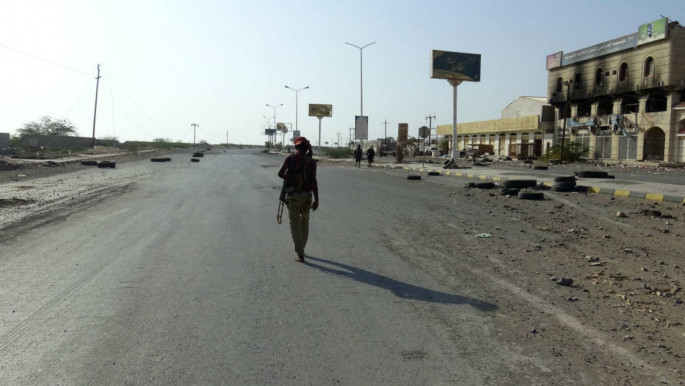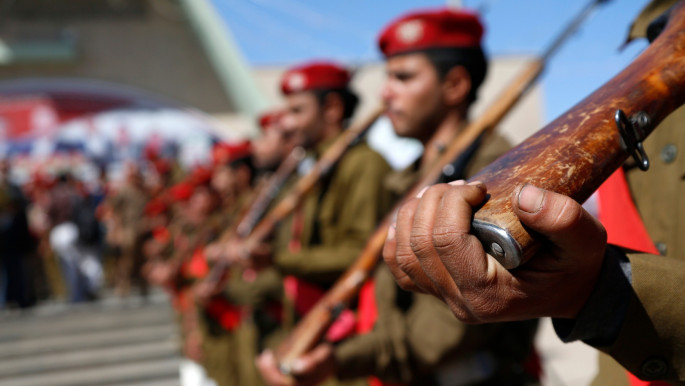Saudi Arabia's faltering divide and rule strategy in Yemen
Some analysts have therefore suggested that peace could be on the horizon, while considering the announcement a response to the coronavirus crisis, particularly after the World Health Organisation (WHO) warned last month of a pending explosion of Covid-19 cases in the war-torn country.
Striking a ceasefire gives Saudi Arabia the moral high ground with the international community, particularly as its five-year-long intervention in Yemen has damaged its global reputation.
Yet this fragile deal, with such a short timeline that it leaves open the possibility of continued Saudi intervention, highlights Riyadh's real aim of keeping Yemen weak and divided, whilst retaining some influence in the country and protecting its image internationally through such PR moves.
The Houthis claimed on 10 April to have downed a Saudi spy plane that was still operating in Yemen, showing Riyadh's continued interference during this temporary lull in violence. Days before the ceasefire, Saudi Arabia continued pounding Yemen with airstrikes.
 |
Saudi Arabia seeks a weakened Yemen it can easily control, to position itself as the dominant power in the Arabian Peninsula |  |
After all, Saudi Arabia knows very well that the Houthis will likely resume their war efforts to establish control in these areas, given past trends, which could justify further Saudi intervention.
Riyadh secretly tried to negotiate with the Houthis in the past, particularly during the Kuwait talks of 2016, offering them limited control. The Houthis rejection of this proposal shows the faction was still keen to bolster its influence in the country.
Furthermore, the Houthis in mid-January launched more aggressive attacks on al-Jawf and Marib following November's Riyadh Agreement designed to restore the government of Abdrabbuh Mansour Hadi's influence, while shoring up Riyadh's influence.
The Houthis have since made considerable gains in these areas and would not want to concede any ground to Saudi-backed forces, despite pressing risks of Covid-19 spreading across the country.
Riyadh also still imposes its crippling blockade on Yemen, which triggers continued Houthi violence, indicating its primary concern is not Yemen's humanitarian well-being.
 |
|
| Read more: War-weary Yemenis eye a shaky ceasefire with suspicion |
Saudi Arabia's air force has also deliberately targeted healthcare infrastructure, crippling its abilities to combat various ailments like cholera, which has reached over one million cases.
Furthermore, Riyadh has often announced ceasefires which it later breached, particularly last September after the Iran-linked attack on the Aramco oil facilities.
Saudi Arabia has worked between keeping the Houthis afloat in Yemen, rather than fully defeating them, and balancing its role with Hadi.
Though Saudi Arabia technically 'supports' the Hadi government, the president's status as the UN-recognised leader merely grants Riyadh legitimacy to intervene in Yemen and undermine its independence. Riyadh would prefer a weakened Yemen over a more stable country, even with Hadi in power.
Since Saudi Arabia's foundation in 1932, it has sought to control Yemen, traditionally perceiving it as 'rightfully' part of its kingdom. Yet given its inabilities to absorb Yemen into its own territory, Saudi Arabia seeks a weakened Yemen it can easily control, to position itself as the dominant power in the Arabian Peninsula.
Read more: Yemen in Focus: Houthis' Riyadh attack a 'bargaining chip'
From backing the deposed royalists in North Yemen in the 1960s to counter the Egypt-backed Republican coup in 1962, to backing southern separatists in 1994 following unification to punish Ali Abdullah Saleh's defiant stance against the 1991 Gulf War, while previously financing Salafism in northern Yemen, Riyadh has long-sought to undermine Yemen's stability. It has also established serious economic links with Yemen, particularly in the north.
More recently the Houthis, who emerged in the 1990s, present an opportunity for Riyadh to intervene further in the country. Yet throughout the war the threat they present to Saudi Arabia's influence has increased.
 |
Saudi Arabia has worked between keeping the Houthis afloat in Yemen, rather than fully defeating them, and balancing its role with Hadi |  |
The Houthis continued missile attacks on Saudi Arabia in March, after repeatedly firing on southern Saudi territory last year. These looming threats of a continued Houthi assault slightly irk Riyadh, though not providing a major security threat, due to the Houthis' limited capabilities to cause real damage.
Though Saudi Arabia has expended upwards of $100 billion since March 2015, it is committed to intervening in Yemen, being driven by these ideological and geopolitical concerns, though at an obvious cost.
Another blowback is that Saudi Arabia's war has allowed other regional powers to move in, namely Iran and the United Arab Emirates (UAE), who have both established more concrete influence throughout the conflict.
The Riyadh Agreement in November, designed to unify Saudi-backed government and UAE-backed separatist forces, has shown recent signs of faltering with clashes between them from 20 March. Under Riyadh's nose, UAE-backed militias still grapple with government forces over the geostrategic Socotra island, along with other southern areas.
Having backed a wide range of southern separatist forces, the UAE has established unprecedented influence in southern Yemen, in a bid to secure an independent south Yemen and consolidate its sphere of influence over the Red Sea.
 |
|
| Read more: Yemen in Focus: UN's lax approach 'emboldens Houthi violence' |
Though Emirati Minister of State for Foreign Affairs Anwar Gargash tweeted on 13 April that Abu Dhabi supports de-escalation and a peaceful solution to Yemen, UAE-backed forces still possess more authority than government forces in the south. Abu Dhabi has made no efforts to reduce its own militia presence.
Saudi Arabia's regional rival Iran has established a gradual presence with the Houthis, particularly in the second half of 2019 as both sides became more open about their ties with one another, after Tehran previously denied assisting the Houthis.
After the United States' killing of leading Iranian general Qasem Soleimani in January, the Houthis organised large protests while calling it "a clear attack on all Muslims", showing their deepening loyalty to Iran.
As the Houthis are now firmly established in north Yemen, Tehran will have a greater say in Yemen's political future than Riyadh initially hoped, after Saudi Arabia pushed the Houthis into a tighter corner.
Hadi has limited authority over the country, meaning that the UAE and Iran are increasing power brokers in Yemen, having authority over two major factions on the ground.
Read more: Three big lessons from Yemen's five years of war
Coordination between Iran and the UAE has increased over Yemen, particularly after communication over the coronavirus outbreak, building on previously growing ties with one another. Gargash recognised in November that the Houthis will play a greater role in Yemen's future.
Negotiating with the Houthis is essential for achieving an independent southern state. As the Riyadh Agreement is fragile and risks falling apart, this further shows that Yemen is far from stability despite the ceasefire, yet future Emirati and Iranian cooperation may overshadow Saudi influence.
Though leading the war on Yemen since March 2015, this now leaves Riyadh in a difficult position.
While seeking to keep Yemen weak and divided, yet with no real long-term plan for its political future, it has inadvertently limited its own influence throughout the conflict. Continued intervention will likely produce further contradictory results.
Jonathan Fenton-Harvey is a freelance journalist.
Follow him on Twitter: @jfentonharvey


![President Pezeshkian has denounced Israel's attacks on Lebanon [Getty]](/sites/default/files/styles/image_684x385/public/2173482924.jpeg?h=a5f2f23a&itok=q3evVtko)



 Follow the Middle East's top stories in English at The New Arab on Google News
Follow the Middle East's top stories in English at The New Arab on Google News


